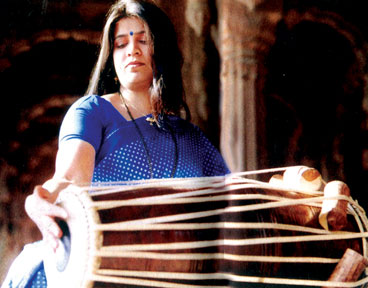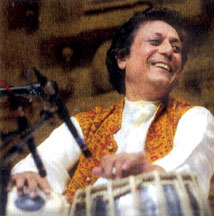The gorgeous Darbar celebration at Royal Festival Hall
By Gwen Herat
|

Chitrangana Agle-Reshwal mesmerises the audience with her deft
handling. Playing solo gentle where it mattered, superceding a
male player on this instrument.
|
Ten years ago if someone asked me to listen to Indian classical and
carnatic music at the Royal Festival Hall, I would have though that
person to be out of his mind. Not so today though this form of music is
French to me except the little I was associated with at the Kalashestra
where I studied Indian Classical dance for awhile.
By and by I got used to the sounds that came off their instruments or
the rhythmic beats that went into my footwork. I appreciated the sitar
and the tabla.
We had the great Ravi Shankar dropping by Kalshestra on and off but
he was at that time, only a genius in the making.
But no way can I comprehend or compare English classical music I
studied that still run through my blood.
Finally, when I decided to go to the Darbar Festival at the Royal
Festival Hall, I thought I was out of my mind. My fried Maya too was not
keen but we went over with open minds, just out of curiosity.
Curiosity
Was I disappointed?
While curiosity killed the cat, I found my feet tapping gently to the
beats of the tabla; I turned around to see whether it was a predominant
Indian audience. I was quite surprised to see very few, they were all
Britons I supposed.
The Lucknow style tabla solo took off on a beat that sounded like the
drop of heavy rain and continued to a crescendo. It was a breathtaking
solo but only a phenomenon like Pandit Swapan Chaudri could thump. His
music is the spontaneous expression of powerful emotion with a deep
knowledge of the instrument of which I know very little but able to
understand how it is handled to produce such a deep vibrating sound on
the human ear.
|

Pandit Swapan Chaudhri, one of the world's greatest tabla
players |
Pandit Chaudri had debuted at the Queen Elizabeth Hall in 2006 and
kept coming back every year for the festive season and perform along
with such great names as Vladimir Jurowskl, Sir Simon Rattle, Sir Marl
Elder and Esa-Pekka Solenen. The tabla provides an insight into the life
and times of Pandit Swapan Chaudri, celebrated as one of the greatest
tabla players.
Darbar festival
The celebrated event in all its oriental splendour, the glory that is
Indian, in all its form features Indian classical music performed by
world-renowned musicians from India and the United Kingdom. The festival
offers the rare opportunity to hear Hindustan, Carnatic and Drupad
traditions that have been evolving for centuries.
The Darbar Festival's Artistic Director emphasises the high quality
that Indian music is made of and one of the finest classical forms in
the world. Artistic director, Sandeep Virdee leaves no stone unturned to
bring out the essence from his troupe.
The ancient texts of the Vedas contain the raga traditions that make
up the bulk of the classics and passed down orally until the last
century when it was noted but sadly remains one of India's most
overlooked art forms with insufficient data not held in any repertory
but the legacy continues.
This leads to outstanding masters dying in total obscurity.
But the 20th century changed the scenario to surface greats such as
Ravi Shankar, Zakir Hussain and Vilayat Khan, but there is an array of a
phenomenal set of musicians who have been rarely or not heard outside
India. Prominent among them is the spectacular Chitrangana-Agle Reshwal
the only female double-sided drum player who performed a rare solo that
stunned not only me but the whole auditorium.
Along with Pandit Choudri, there were Ram Deshpand who made his debut
and regarded as one of the most talented and upcoming maestros in Indian
vocals but the enigmatic Pushpraj Koshti who played the surbahar, an
instrument like a bass sitar, really intrigued me.
Quality performers
Though Darbar features the highest quality performers on Indian
classical music which even BBC Radio airs, they do not only focus on the
established ones.
The doors are open to the very talented ones seeking recognition and
they afford them the opportunity to help develop and come to the United
Kingdom for exposure.
To artistic director, Sandeep Virdee, classical Indian music belongs
to all; it is their global heritage. So, he makes it his mission to
present them in the truest form.
At the Royal Festival Hall, along with the one I attended, there had
been 15 concerts with ‘in conversation sessions’ to update those who
wanted information before they sat down to hear them play. There was
something to please everyone, from the ardent followers of the genre to
complete novices like me. The concerts were time to immerse yourself in
ragas which means to create a melody, at the correct time of day to
maximise enjoyment and connecting the most outstanding music.
The Royal Festival Hall runs special concerts from 10 am to 10.30 so
to allow the musicians to play the rages at their tradition period of
the day. Then the correct feel is surfaced.
On the day I saw the Darbar Festival in attendance, it was with Khan
a seventh-generation musician, deputing morning Ragas UK concert
performing the gayaki style on the sitar which imitated the subtleties
of the human voice.
He was accompanied on the tabla by one of India's greatest tabla
maestros, Pandit Swapan Chauduri. Earlier, I saw Chitrangana
Agle-Reshwal, the only female player on the double-sided drum. She was
simply out of this world. |


